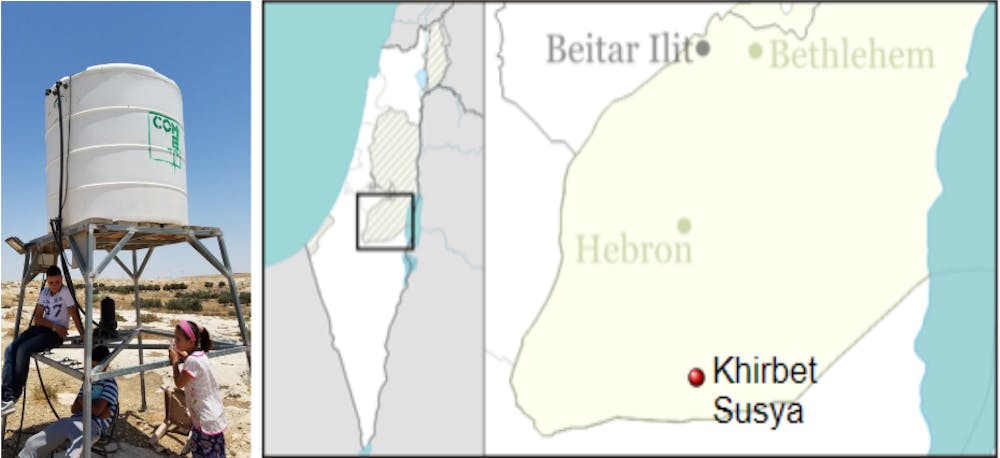Water availability hasn’t always been a problem for Susya, a Palestinian village in the Israeli-controlled part of the southern West Bank (see the map above). Until recently, the village has been able to fulfill its needs from rainwater collection. However, between 1999 and 2001, the Israel Defense Forces destroyed most of the cisterns Susyans used to collect water.
Unable to obtain permits from the IDF-controlled Civil Administration to rebuild permanent water infrastructure, the villagers were forced to regularly ship water from nearby Yatta. This plan, however, did not provide enough water for Susyans to grow their crops or graze their livestock. To rectify this issue, the villagers turned to Comet-ME, an Israeli-Palestinian environmental NGO, which helped them establish a rainwater collection system (see the image above) despite the Israeli government’s tenuous assertion of the construction’s illegality. Research for this and similar projects - not to mention the grassroots networks enabling the foundation of NGOs like Comet-ME - would be impossible without think-and-do tanks like the Arava Institute for Environmental Studies. Arava is an NGO based in Israel that conducts research on pressing ecological issues that impact the region and directly implements this research into practice (primarily in the West Bank) in order to solve environmental problems that overlap with the Israeli-Palestinian conflict. This solutions-based approach is why we, J Street U Duke, co-sponsored The Dialogue Project with the Duke Environmental Alliance.
Last week, a guest column was published in opposition to this event calling for environmental justice instead of dialogue. Although they failed to acknowledge the palliative role of Arava and similar institutions in the conflict, the authors expressed numerous legitimate criticisms of Israeli policies towards the Palestinians. If the authors of the editorial actually attended the event, they would have heard many of the same criticisms from the speakers themselves. Arava focuses on solving environmental problems, including government-created ones. However, the Arava Institute and its affiliates also understand they cannot morally grandstand their way to environmental justice.
As admirable as the pursuit of justice may be, it cannot be achieved unilaterally: look no further than Gaza. For the past 12 years, Hamas, the Palestinian Authority, and the Israeli government have flung well-deserved blame at each other for the territory’s miserable living conditions. The PA refuses to pay Gaza’s water bills, Israel prevents Gazans from importing materials necessary for basic municipal infrastructure, and Hamas refuses to redirect its own resources from military infrastructure toward basic economic necessities. If government entities talked more and sparred less, they could find a way to alleviate the crisis without surrendering their political objectives—that’s why we need dialogue.
Dialogue is a crucial tool for solving animosity and conflict between Israelis and Palestinians. Arava provides its attendees—one-third Jewish Israelis; one-third Palestinians from Israel, the West Bank, and Jordan; and one-third international students—a space to share their lived experiences. While these conversations don’t solve problems by themselves, they motivate Arava’s important work regarding the disappearance of the Dead Sea, Palestinians’ lack of energy infrastructure and the impending ecological collapse in Gaza. The institute recognizes that its work alone will not solve the underlying political issues or create a peace deal, but working to end the humanitarian crisis in Gaza and guaranteeing livelihoods for villages like Susya should be considered obvious benefits of cooperation that help lay the necessary foundations for a just resolution to the conflict.
As students who are both pro-Israeli and pro-Palestinian, we understand the importance of assigning blame for reckless policies and seeking to change them; we haven’t been shy about speaking up in the past. Our current work, such as our Stop Demolitions, Build Peace campaign and our efforts to bring organizations such as the Israel Policy Forum to campus, focuses on replacing the injustices of current Israeli policy with more constructive approaches. But we can’t make these improvements if we don’t talk about them. Moreover, dialogue that inspires these improvements builds trust between people. Without this trust, we will never come to an agreement that provides each side with the justice, security, and dignity it deserves.
Anyone seeking peace and justice in Israel and Palestine should support pro-cooperation, pro-dialogue organizations like Arava, Comet-ME, Yahel or others like them. By attending their events and participating in their projects, we support those who refuse to be antagonists and work to help end the conflict. Dialogue doesn’t stand in the way of justice; it brings us closer to achieving it. We at J Street U Duke hope that you’ll help us promote dialogue rather than demonize it. If you want to make a difference, we want to hear your voice—even if you disagree with us. Just remember that we can’t create change if we don’t talk to each other.
J Street U Duke is a pro-Israeli, pro-Palestinian, pro-peace group on campus that supports a two-state solution to the Israeli-Palestinian conflict. If you have any questions, feel free to email alexander.frumkin@duke.edu. Josh Curtis is a Trinity senior. Alex Frumkin is a Trinity sophomore.
Get The Chronicle straight to your inbox
Sign up for our weekly newsletter. Cancel at any time.

